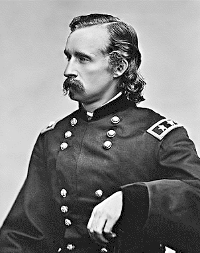On This Date In History
Was Custer Selfish?
January 26, 2015
Today, the question of what happened at Custer's last battle is one that intrigues many - for no white man from Custer's command survived to tell the tale. Much research has been done, and conclusions drawn about what Custer might have been thinking that day.
Unfortunately, many of the questions of the LBH (Little Bighorn) begin and end on that day. But shouldn't we be able to look back on Custer's career and see what he might have been thinking? After all, LBH wasn't his first rodeo. He'd served with distinction in the Civil War, and in previous Indian battles. He'd also written a good deal about his experiences in both. Couldn't we examine his life and career in order to create a profile that could give us some insight into what he was thinking that day? If such an effort would prove valuable, perhaps a good place to start would be seeking an answer to the question of whether or not Custer was selfish.
Many of Custer's critics claim that his military career (including the Civil War and Indian Wars) was one marked by selfishness - that Custer's main goal when entering battle was more about making himself look good than it was about anything else. They feel that the destruction that such a trait can bring was put on full display when he was defeated at the battle of the Little Bighorn.
But what were Custer's thoughts on selfishness? What were his views on going into battle with personal acclaim being one's main motivation? In an article written for the magazine, Turf, Field, and Farm, dated Dec. 15, 1867, he provided his thoughts on the subject.
He writes of an officer and his men who had been sent out from camp on a task. The officer had navigation issues and upon seeing his own camp, believed they were Indians...
"He surmised that we could be no other than the tribes we had been pursuing, and the question arose in his mind whether to return to camp, and with the entire force return to the attack, or with his little detachment make a bold strike and reap all the glory to be derived from a brilliant charge upon an immensely superior force of Indians. With commendable but rather selfish gallantry, he preferred the latter, and determined to assume a bold front, trusting to his sabres to do the rest."
What do these words tell us about Custer?
- That he believed this officer guilty of selfishness - the very trait that so many now use to describe him!
- That he claimed to look down on selfishness on the battlefield.
- That he was aware of the idea of selfishness on the battlefield, and went so far as to identify it in another.
- That he understood and appreciated the importance of motivations of participants in warfare.
- What may (or may not) have been going through his mind that day at the LBH.
Also noteworthy is that he used the word "commendable", in that, his gallantry was commendable. But it was the motivation of "seflishness" in which he was in error, besides attempting to attack his own camp.
Further, Custer's words eerily describe a situation he himself would face a few years later at the LBH facing an "immensely superior force of Indians".
But what can we really collect from these words?
-
Can we be
sure Custer wasn't selfish at times on
the battlefield?
No. -
Can we safely conclude that his
feeling toward selfishness on the battlefield were
always the same as they were when writing?
No. -
Can we be certain
that Custer didn't act out of selfishness at the LBH?
No.
Although these words may seemingly prove nothing for certain, they do tell us that Custer was aware of selfishness in battle and that it was a liability to it's possessor. In the end, these words do serve to add some color to the seemingly black and white version we are so conveniently served of the man: a foolish and selfish individual who reaped the bitterest reward of those poor traits. Perhaps Custer wasn't these things after all. Perhaps we can feel free to consider his career and final battle differently now - in a more dynamic light. Perhaps there's more to this story than we thought.
About the Author
Tim Kloos is an online advertising professional. He helps clients with their websites, online presence, and online advertising. If you need help with any of these, feel free to contact him via the contact page.
His tech website is clevelandwebdesignplus.com.
He has also written a children's book set in the Old West.
